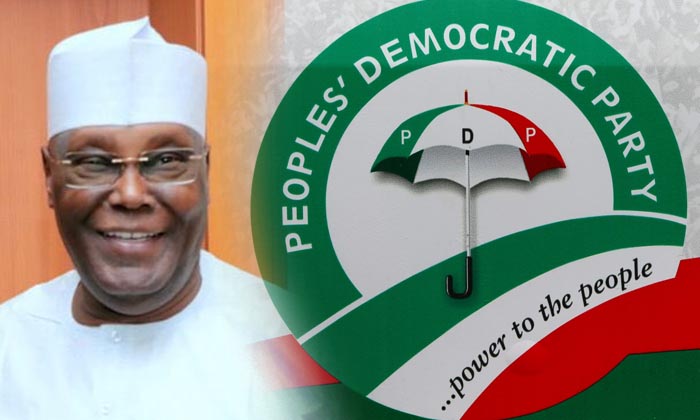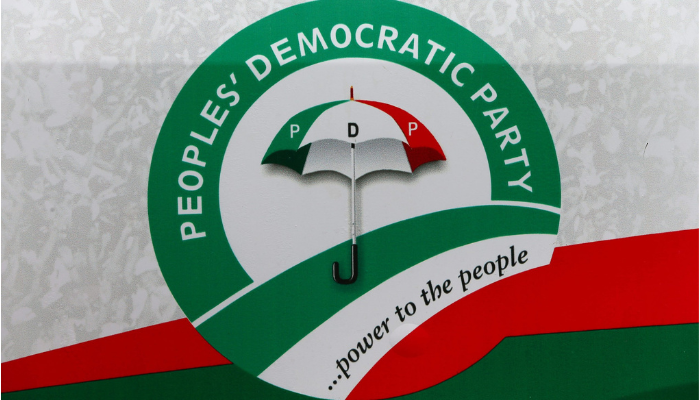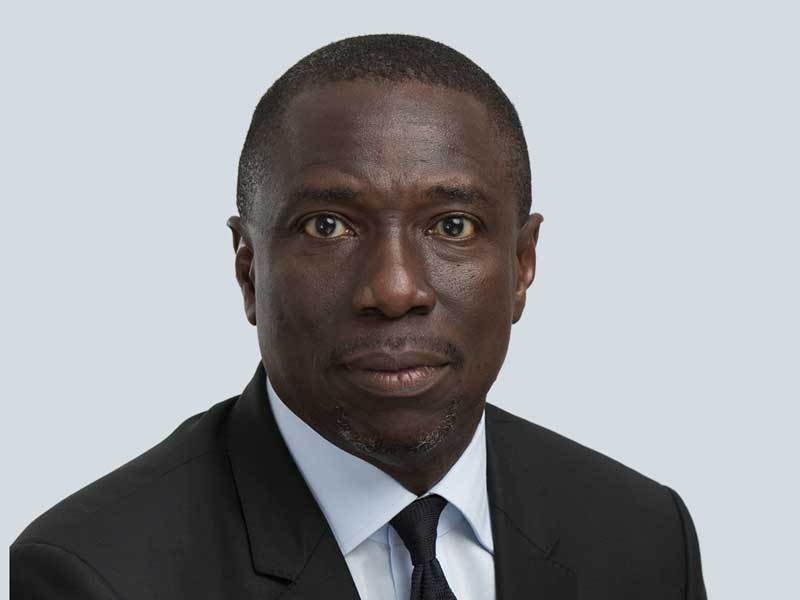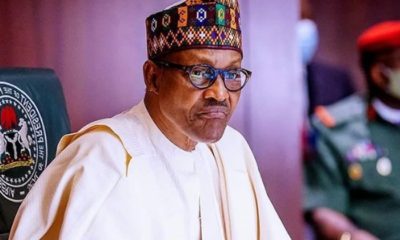Politics
No one can stop my passion, zeal to improve Nigerians’ livelihood – Buhari

President Muhammadu Buhari in the course of the week reiterated the determination of his administration to uplift the quality of life of the citizens in spite of the harsh socio-economic realities.
He said that the passion and zeal for improving the livelihood of Nigerians had not dwindled, calling for more steadfastness as Nigerians.
The president gave the assurance when he received former State Chairmen of the defunct Congress for Progressive Change (CPC) at the State House, Abuja, on Tuesday.
He, however, urged political leaders to stay focused and uphold the ultimate objective of promoting interest of the country.
The president said the self-centeredness that led to the loss of about a million lives between 1967-1970 must not be allowed to repeat itself.
The president, who is also the Minister of Petroleum Resources, had also consented to the acquisition of Mobil Producing Nigeria Unlimited by Seplat Energy Offshore Ltd., a Nigerian outfit.
ExxonMobil, the parent company had earlier entered into a landmark Sale and Purchase Agreement with Seplat Energy to acquire the entire share capital of Mobil Producing Nigeria Unlimited from Exxon Mobil Corporation of the U.S.A.
The agreement would also enable Seplat Energy to acquire share capital from Mobil Development Nigeria Inc., and Mobil Exploration Nigeria Inc., both registered in Delaware, USA.
Mr Femi Adesina, the president’s spokesman stated on Monday in Abuja that the president’s consent was in consonance with Nigeria’s drive for increased indigenous participation in the energy sector.
Also on Monday, the president congratulated the Ministry of Youth and Sports Development, Sports Federations and Associations on the performance of Team Nigeria at the 2022 Commonwealth Games in Birmingham, United Kingdom.
Team Nigeria posted an impressive outing at the competition, finishing seventh on the medals table with 12 gold, 9 silver and 14 bronze.
On the same day, Buhari forwarded the name of Muhammad Sabo Lamido to the Senate for confirmation as Executive Commissioner, Finance and Accounts, for the Nigerian Upstream Petroleum Regulatory Commission.
Buhari, in a letter addressed to President of the Senate, Ahmed Lawan, said Lamido was being nominated due to the death of Hassan Gambo, who occupied the position until his demise.
The president also received the new Executive Members of Nigerian Medical Association (NMA), in the Presidential Villa, Abuja, on Tuesday.
At the meeting with the NMA officials, Buhari disclosed that the Federal Government had disbursed N100 billion to indigenous pharmaceutical manufacturers and healthcare investors as loans to expand their capital base.
He said it was also meant to boost local production of medicines and medical consumables.
Buhari stated that the loan was extended through the Central Bank of Nigeria’s support to the private pharmaceutical sector.
The president also announced the appointment of former Permanent Secretary, Ecological Project Office (EPO), Dr Habiba Muda-Lawal, as Special Adviser to him on Policy and Coordination.
Buhari also hosted the Director-General of the All Progressives Congress (APC) Presidential Campaign Organization, Simon Lalong, in the Presidential Villa, Abuja, on Wednesday.
Lalong, who is also the Governor of Plateau, said he was in the Presidential Villa to thank the president for approving the University of Jos as a national cancer centre.
He also lauded Buahri for granting presidential pardon to the former Governor of the state, Joshua Dariye.
According to him, the people of the State will remain grateful to the president for delivering a lot of democratic dividends to the State.
Also on Wednesday, President Buhari joined members of staff and political appointees in the State House in congratulating the Permanent Secretary, Tijjani Umar, on his 59th birthday.
The president congratulated Umar, his family, friends and professional colleagues on the auspicious occasion.
Buhari appreciated Umar’s efforts, sacrifices and dedication to effective management of the State House.
Buhari unveiled the 2023 National Population and Housing Census Project Document, aimed at promoting robust and informed national conversation on procedures for the census.
He unveiled the document at the National Stakeholders Summit on the 2023 census, organised by the National Population Commission (NPC), in collaboration with the UN Population Fund (UNFPA) Nigeria in Abuja on Thursday.
Buhari also hosted representatives of victims of Kaduna train abduction in Abuja, on Thursday.
According to the president, the Federal Government was doing everything within its powers to ensure the safe return of the remaining abducted passengers of the ill-fated Abuja-Kaduna train.
He said, ”since the terrible and cowardly attack by the criminal elements on March 28, the nation had joined them to endure a period of difficulty and emotional pains.”
READ ALSO: Kanu’s life in jeopardy – lawyer writes Buhari’s ministers, Onyeama, Malami
Buhari also explained his reason for discarding the use of lethal military force in extracting the remaining abductees.
The president, therefore, condoled with the families of the victims and those who lost their loved ones.
Buhari also on Thursday received the new President of the ECOWAS Commission, Dr Omar Touray and his Management Team, telling them the kind of sub-regional body West African leaders desire and must have.
Buhari, also on Friday in Abuja, received the Management of BUA Group at the State House led by the Chairman, Abdul Samad Rabiu.
He also inaugurated the National Crisis Management Doctrine (NCMD), to bridge the gap created by extensive deployment of security services through fostering collaboration among Ministries, Departments and Agencies (MDAs).
The NCMD, which was developed by the Office of the National Security Adviser (ONSA), in coordination with relevant MDAs, would ensure greater successes in tackling national crisis.
The president concluded the week with a closed-door meeting with Gov. Hope Uzodinma of Imo in the presidential villa, Abuja, on Friday.
Uzodinma, who spoke to State House correspondents at the end of the meeting thanked the president for graciously granting his request that the Federal Medical Center (FMC), Owerri be converted to Federal University of Technology Owerri (FUTO) Teaching Hospital.
He also disclosed that he sought president’s approval for the Alvan Ikoku College of Education to become Federal University of Education, Owerri
The governor spoke extensively on the forthcoming 2023 General Elections.
HE urged the media to pay more attention to issues like the depletion of the country’s crude oil output and the unsettling security situation in the country.
Politics
APC Fingers Atiku For Nigeria’s Dysfunctional Opposition Parties

The ruling All Progressives Congress (APC) has accused the presidential candidate of the Peoples Democratic Party (PDP) in Nigeria’s 2023 election of culpability in the crisis rocking opposition parties in Nigeria.
This was contained in a statement on Tuesday by its National Publicity Secretary, Felix Morka.
The statement was issued under the subject, ATIKU, YOUR POLITICAL DESPERATION IS RESPONSIBLE FOR PDP’S CATASTROPHIC DISINTEGRATION.
ALSO READ: Afenifere, Obi Laud Babalola For Withdrawing Suits Against Farotimi
It reads, “The former Vice President and Presidential candidate of the Peoples Democratic Party (PDP) in the 2023 presidential election, Alhaji Atiku Abubakar, like a badly broken record, has continued to point fingers at the All Progressives Congress (APC) for the festering rot in his party, and the spectacular dysfunction of opposition parties generally.
“At the national conference on Strengthening Democracy in Nigeria held in Abuja on Monday, January 27, 2025, Atiku, warned that the nation’s democracy was somewhat imperiled by judicial involvement in electoral matters. Also, without a shred of evidence, Atiku alleged that President Bola Ahmed Tinubu was paying certain opposition leaders a whooping 50 Million Naira each to discombobulate opposition parties in the country.
“It was in the Atiku era as Vice President, particularly in 2003 and 2007, that the PDP conducted the worst elections in our political history. We cannot possibly forget how Atiku’s PDP heavy-handedly captured most South-West states and vowed to remain in power for 60 years. It was in those same years that Atiku’s former boss and then President of the Federal Republic of Nigeria, Chief Olusegun Obasanjo, infamously described election as a “do or die affair” in a desperate attempt to annex Lagos. If democracy was neither derailed nor endangered in those perilous days, is it now that elections are by far freer, fairer and more credible that Nigeria risks losing democracy?
“The judicial branch of government is a constitutional creation like the executive and legislative branches with its constitutionally defined powers to adjudicate disputes among citizens and between citizens and the state. Atiku cannot wish away or seek to abolish enshrined power of the courts to intervene in civil disputes, including electoral disputes, in cases where the authority of the court is validly invoked by a litigant.
“It is a thing of irony that Atiku, who is Nigeria’s most prolific electoral litigator, would make such a ludicrous claim that judicial involvement in electoral matters is a threat to democracy. His criticism of the courts and the electoral process rings hollow given his long history of using the courts to further his political agenda. It’s time for him to take a step back and let the democratic process unfold without his interference.
“Nigeria’s democracy is far stronger than Atiku’s political ambitions. We deserve better than petty politicking and alarmist rhetoric from an elder statesman. As a veteran politician, one would expect Atiku to understand that while democracy may be about winning election, it is, more importantly, about respecting the will of the electorate and working towards the greater good of all. Atiku should focus on rebuilding his party and offering constructive solutions to Nigeria’s challenges.
“Atiku’s allegation that the APC-led administration was paying out 50 Million Naira to some opposition figures is simply bogus and laughable. Atiku knows that his political desperation is responsible for the PDP’s catastrophic disintegration. Peddling rumors and unsubstantiated allegations should be beneath anyone in the standing of an elder statesman, a former Vice President and a serial contestant for the exalted office of President of the Federal Republic of Nigeria.
“The bizarre suggestion by opposition figures like Atiku, Peter Obi, and recently, aggrieved leaders like Mallam Nasir El-Rufai that our great Party may be complicit in the internal corrosion of opposition parties is pitiful, and only an incompetent alibi for their crass failure to manage their own affairs. They cannot govern their parties but tout their ability to govern Africa’s most populous country.
“As discerning citizens, Nigerians know better than to be distracted by the false alarm and hollow allegations of desperate politicians whose only goal is shore up their political relevance in the build up to 2027 general elections.”
Politics
‘I Can Only Be Removed At A National Convention – PDP’s Samuel Anyanwu Declares

The National Secretary of the Peoples Democratic Party (PDP), Senator Samuel Anyanwu, has reaffirmed his position, stating that his election at the party’s national convention ensures that only another national convention can remove him from office.
Anyanwu made this assertion during a meeting of the National Working Committee (NWC) members of South East extraction with party stakeholders from the region on Tuesday.
Addressing concerns about his tenure, the Senator detailed past attempts to undermine his position, which he described as politically motivated.
READ MORE: GTI Mourns Ohanaeze’s PG, Iwuanyanwu
He recounted, “In 2023, I expressed my intention to contest the governorship of my state. I formally informed the party that I would be away for three months and delegated my deputy to oversee my duties during my absence. However, unknown to me, the former South East Zonal Vice Chairman, Ali Odefa, was orchestrating plans to remove me from office.”
Anyanwu further alleged that Odefa manipulated the region’s sole PDP governor, Peter Mbah, into supporting his removal.
“He deceived the only governor we have in the South East to believe that I needed to be removed,” he said.
More to follow………..
Politics
Ighodalo Drags Edo APC Chairman To Court Over Viral Defamation Video

The Peoples Democratic Party (PDP) candidate in the last Edo State governorship election, Dr. Asue Ighodalo, has filed a ₦500 million defamation lawsuit against the acting Chairman of the All Progressives Congress (APC) in Edo State, Jarret Tenebe.
The suit, which was filed at the Lagos State High Court, Tafawa Balewa Square, seeks damages, a retraction of the alleged defamatory statement, and a public apology from Tenebe.
READ MORE: Nigerian Man Dies In Ethiopian Prison After Being Denied Medical Care
The case stems from a statement made by Tenebe in a viral video on December 10, 2024, where he accused Ighodalo of corruption and misappropriation of state funds.
In the video, Tenebe alleged, “Asue Ighodalo will not make such a mistake because he has stolen billions before.”
The controversial remarks were made in response to a gaffe by Governor Monday Okpebholo during the presentation of his ₦605 billion budget estimates to the Edo State House of Assembly.
Prior to filing the lawsuit, Ighodalo, through his legal representatives, Banwo and Ighodalo, issued a pre-action notice on December 11, 2024, demanding an apology and a retraction of the statement within seven days.
However, Tenebe, through his lawyer, Dr. Blessing Agbomhere, denied any wrongdoing and refused to comply with the demands.
“We further want to state unequivocally that our client did not defame your client in any way, and as such, there is no need for a public apology or retraction of comments made in the alleged video,” Agbomhere said in a written response.
“But if your client decides to stretch this issue further by going to court, we will rely on the defence of justification in accordance with the report of the Edo State Vehicle Recovery Committee, whose report indicted your client, and the preliminary report of the Edo State Asset Verification Committee.”
In his suit, Ighodalo argues that the viral video was intended to damage his reputation and expose him to public ridicule.
He claims the statement has caused significant distress and embarrassment, as many of his colleagues, business partners, and stakeholders have questioned the allegations.
“Undoubtedly, this development has exposed our Client to great distress, hurt, and humiliation,” the pre-action notice stated.
Ighodalo is urging the court to order Tenebe to issue a public apology and retraction within seven days of the judgment, alongside awarding him ₦500 million in damages for the harm caused to his reputation.
The case is scheduled to be heard by Justice A.O. Opesanwo on March 5, 2025.





















